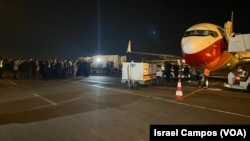"The remains of José Eduardo dos Santos have arrived in Angola after a long waiting period," Marcy Lopes, a government minister, told reporters shortly after the casket, draped in the Angolan flag, was taken off the airplane.
Outside the airport, a small crowd clapped as the funeral car transporting Dos Santos' body drove off to Miramar, his former official residence in Luanda.
The funeral is likely to take place on Aug. 28, Dos Santos' birthday, MPLA spokesperson Rui Falcao said.
There have been weeks of uncertainty over the former president's final resting place. Dos Santos, who stepped down in 2017 after 38 years in power, died on July 8 at the age of 79 at a clinic in Barcelona, where he was being treated following a long illness.
Critics of the ruling MPLA party worried that with a tight election due to take place on Wednesday, the party could seek to politicize the repatriation of dos Santos' remains, diverting attention from the main opposition party UNITA's campaign and from the electoral process.
Some MPLA supporters said the return of the ex-president's body to Angola was important to them.
Sónia, 41, an MPLA supporter at a big rally in the outskirts of Luanda on Saturday, said: "For us him coming back to Angola before the election shows the importance he had to create peace in our country."
"It seems like a very transparent maneuver to monopolize the media, as usual," Jon Schubert, a political anthropologist and Angola expert at the University of Basel, told Reuters, referring to the repatriation of Dos Santos' body. Most Angolan media is controlled by the state.
Angola is gearing up for an election that is likely to be the tightest since the first multi-party election there in 1992. Voters will elect a new parliament and president.
The MPLA, which was dos Santos' party and is that of President Joao Lourenço, has governed Angola since it won independence from Portugal in 1975.
Launching his party's campaign last month, Lourenço urged people to vote for the MPLA to honor Dos Santos' legacy.
Some MPLA supporters said the return of the ex-president's body to Angola was important to them.
Sónia, 41, an MPLA supporter at a big rally in the outskirts of Luanda on Saturday, said: "For us him coming back to Angola before the election shows the importance he had to create peace in our country."
The opposition UNITA is stronger than ever and anger is growing at government failures to convert vast oil wealth - Angola is Africa's second-biggest oil producer - into better living conditions for all.
Half of Angolans live in poverty and more than half of those under 25 are unemployed, facts which UNITA hopes to capitalize on in promising a change of regime. Half of voters are under 35.
An Afrobarometer survey in May showed Angolans favoring UNITA, led by the charismatic Adalberto Costa Júnior, had increased to 22% from 13% in 2019, still seven points behind the MPLA. Nearly half of voters were undecided.
Justin Pearce, senior lecturer in history at South Africa's Stellenbosch University, said that while Lourenço was battling to retain support he did not believe there was "any deep nostalgia for dos Santos in Angolan society".
Although handpicked by dos Santos, Lourenço swiftly moved to investigate allegations of multi-billion dollar corruption during the former president's era. Pearce said this was aimed at gaining "some popular legitimacy".
Dos Santos never specifically responded to the allegations that he had allowed corruption to become rampant.
At Saturday's rally, Lourenço told a cheering crowd the MPLA "broke" the corruption taboo and "really started the fight against" it.






![2022 Elections Most Historic Angola Polls Since 92 [02:48]](https://gdb.voanews.com/5a306208-96cb-4159-9f72-8d4f781d4ff6_w33_r1.jpg)




